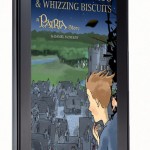“War in Heaven” is a novel written by Charles Williams in 1930. This was his first novel and from what I have read, it was rated as his best novel. I had been meaning to get around to reading this author mainly since he was one of the famous Inklings and a sale on his books helped me to get around to it.
This novel is a supernatural thriller and involves the Grail being found in a country parish in England. It starts with the finding of the body of an unidentified man in a publishing house and a set of coincidences in this publishing house lead to the finding of the Grail by an Anglican Archdeacon. This novel moves beyond just a thriller with two opposing groups, but has a deeper theological level. The battle of good versus evil is played out over the acquisition of the Grail which passes between the two sides. The use of the Grail by the forces of evil displays characters that are not your stereotypical villains. There is the banality of evil about them that makes what they do even more scary. The Archdeacon is also not exactly your typical hero in a thriller. Certainly a Christian hero willing to sacrifice and turn the other cheek and who has true meekness that means fighting for the truth and not surrendering to evil.
I quite enjoyed this novel, but thought it was just a bit flawed with the introduction of Prester John later into the novel. I really didn’t think the character added much to the story and if anything weakened it a little. Reading this novel it also reminded me of some of C.S. Lewis “Space Trilogy.” After reading this novel I found that others also thought that Lewis was certainly influenced by this and William’s other novels.
There is also some interplay with Catholicism and Anglicanism as one of the people that helps out the Archdeacon is Catholic. There is even a slight reference to Apostolicae Curae, which was not named but hinted at in one of the conversations. Certainly a sticking point for high-church Anglicans, but this small exchange was not contentious.
I also find it rather interesting that the themes of the occult and Christianity played out in his own life. When in his early thirties he was a Rosicrucian and belonged specifically to the Fellowship of the Rosy Cross one of the several groups involved in theosophy at the time. It was not uncommon for some Christians to belong to one of these groups and also attend a Christian church. It appears that was the case with Charles Williams and he had only stopped attending these meetings three years prior to publishing this book.
So I look forward to reading some of his other novels which are also described a spiritual thrillers.












